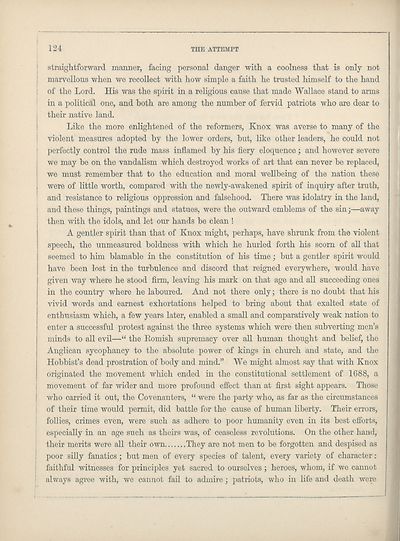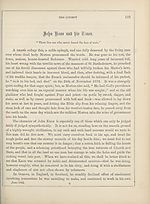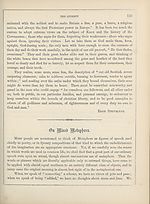Attempt > Volume 1 and Select writings
(136) Page 124
Download files
Complete book:
Individual page:
Thumbnail gallery: Grid view | List view

124
THE ATTEMPT
straightforward manner, facing personal danger with a coolness that is only not
marvellous when we recollect with how simple a faith he trusted himself to the hand
of the Lord. His was the spirit in a religious cause that made Wallace stand to arms
in a political one, and both are among the number of fervid patriots who are dear to
j their native land.
Like the more enlightened of the reformers, Knox was averse to many of the
violent measures adopted by the lower orders, hut, like other leaders, he could not
perfectly control the rude mass inflamed by his fiery eloquence ; and however severe
we may he on the vandalism which destroyed works of art that can never be replaced,
we must remember that to the education and moral wellbeing of the nation these
j were of little worth, compared with the newly-awakened spirit of inquiry after truth,
and resistance to religious oppression and falsehood. There was idolatry in the land,
and these things, paintings and statues, were the outward emblems of the sin;—away
then with the idols, and let our hands be clean !
A gentler spirit than that of Knox might, perhaps, have shrunk from the violent
speech, the unmeasured boldness with which he hurled forth his scorn of all that
seemed to him blamable in the constitution of his time; hut a gentler spirit would
have been lost in the turbulence and discord that reigned everywhere, would have
given way where he stood firm, leaving his mark on that age and all succeeding ones
in the country where he laboured. And not there only; there is no doubt that his
vivid words and earnest exhortations helped to bring about that exalted state of
enthusiasm which, a few years later, enabled a small and comparatively weak nation to
enter a successful protest against the three systems which were then subverting men’s
minds to all evil—“ the Komish supremacy over all human thought and belief, the
Anglican sycophancy to the absolute power of kings in church and state, and the
j Hobbist’s dead prostration of body and mind.” We might almost say that with Knox
originated the movement which ended in the constitutional settlement of 1688, a
movement of far wider and more profound effect than at first sight appears. Those
who carried it out, the Covenanters, “ were the party who, as far as the circumstances
of their time would permit, did battle for the cause of human liberty. Their errors,
follies, crimes even, were such as adhere to poor humanity even in its best efforts,
especially in an age such as theirs was, of ceaseless revolutions. On the other hand,
their merits were all their own They are not men to be forgotten and despised as
poor silly fanatics; but men of every species of talent, every variety of character:
faithful witnesses for principles yet sacred to ourselves; heroes, whom, if we cannot
always agree with, we cannot fail to admire; patriots, who in life and death were
THE ATTEMPT
straightforward manner, facing personal danger with a coolness that is only not
marvellous when we recollect with how simple a faith he trusted himself to the hand
of the Lord. His was the spirit in a religious cause that made Wallace stand to arms
in a political one, and both are among the number of fervid patriots who are dear to
j their native land.
Like the more enlightened of the reformers, Knox was averse to many of the
violent measures adopted by the lower orders, hut, like other leaders, he could not
perfectly control the rude mass inflamed by his fiery eloquence ; and however severe
we may he on the vandalism which destroyed works of art that can never be replaced,
we must remember that to the education and moral wellbeing of the nation these
j were of little worth, compared with the newly-awakened spirit of inquiry after truth,
and resistance to religious oppression and falsehood. There was idolatry in the land,
and these things, paintings and statues, were the outward emblems of the sin;—away
then with the idols, and let our hands be clean !
A gentler spirit than that of Knox might, perhaps, have shrunk from the violent
speech, the unmeasured boldness with which he hurled forth his scorn of all that
seemed to him blamable in the constitution of his time; hut a gentler spirit would
have been lost in the turbulence and discord that reigned everywhere, would have
given way where he stood firm, leaving his mark on that age and all succeeding ones
in the country where he laboured. And not there only; there is no doubt that his
vivid words and earnest exhortations helped to bring about that exalted state of
enthusiasm which, a few years later, enabled a small and comparatively weak nation to
enter a successful protest against the three systems which were then subverting men’s
minds to all evil—“ the Komish supremacy over all human thought and belief, the
Anglican sycophancy to the absolute power of kings in church and state, and the
j Hobbist’s dead prostration of body and mind.” We might almost say that with Knox
originated the movement which ended in the constitutional settlement of 1688, a
movement of far wider and more profound effect than at first sight appears. Those
who carried it out, the Covenanters, “ were the party who, as far as the circumstances
of their time would permit, did battle for the cause of human liberty. Their errors,
follies, crimes even, were such as adhere to poor humanity even in its best efforts,
especially in an age such as theirs was, of ceaseless revolutions. On the other hand,
their merits were all their own They are not men to be forgotten and despised as
poor silly fanatics; but men of every species of talent, every variety of character:
faithful witnesses for principles yet sacred to ourselves; heroes, whom, if we cannot
always agree with, we cannot fail to admire; patriots, who in life and death were
Set display mode to: Large image | Transcription
Images and transcriptions on this page, including medium image downloads, may be used under the Creative Commons Attribution 4.0 International Licence unless otherwise stated. ![]()
| Ladies' Edinburgh Debating Society publications > Attempt > Volume 1 and Select writings > (136) Page 124 |
|---|
| Permanent URL | https://digital.nls.uk/109866586 |
|---|
| Attribution and copyright: |
|
|---|

